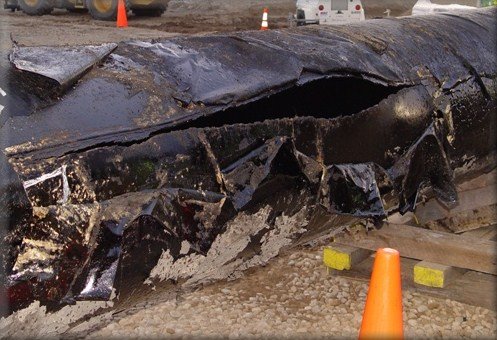|
Home | Consulting | Training | Expert Witness | Failure Analysis | Design Review | Corrosion Test | Corrosion Software | Protective Coatings | Materials Selection | Cathodic Protection | >>> | ||
|
External Pipeline Integrity Assessment and Composite Repairs |
||
|
Course Outline |Who Should Attend |Registration |In-House |On-Demand |Online Courses |PPT Slides+Testbank |Course List | Why WebCorr |
||
| Course Overview | ||
|
This course is available for in-house training, online and distance learning worldwide. It can also be customized to meet the specific needs of your organization.
|
||
|
||
| Course Outline | ||
|
1.1 External corrosion of oil and
natural gas pipelines
2.1 Microbiologically Influenced
Corrosion
3.1 Stress corrosion cracking of
pipeline steels
4.1 Prevention and Mitigation of
Corrosion and SCC
5.1 External Corrosion Direct
Assessment (ECDA) 5.5 Emerging Advanced Technologies for Pipeline Integrity Assessment
5.5.1 Long Range Ultrasonic Testing (LRUT)
or Guide Wave Ultrasonic Testing (GWUT)
6.1 Remaining life calculations
7.1 Composite vs metal materials
7.5 Modeling and prediction of external
corrosion of underground pipelines
|
||
|
Course Outline |Who Should Attend |Registration |In-House |On-Demand |Online Courses |PPT Slides+Testbank |Course List |
||
| Who Should Attend | ||
Successful completion of this corrosion course helps participants prepare for their NACE certification examinations at the Corrosion Technician, Corrosion Technologist and Senior Corrosion Technologist levels.
|
||
| Registration for This Corrosion Course | ||
| In-House Training Corrosion Courses | ||
|
If you are concerned with corrosion in your business, in-house training is a great solution to train a group of employees from design, production, operation, quality assurance, inspection and maintenance, and technical sales and support on corrosion control and corrosion prevention technology. The contents of all corrosion courses can be customized to fit your organization's needs.
There is no minimum or maximum number of participants required for in-house training corrosion courses. We conduct the in-house training corrosion course at your company's premises and at a time convenient to your company. Requests for in-house training corrosion courses from overseas countries are also welcome.
Click
here to contact us
for a quotation. |
||
| Corrosion Course-On-Demand | ||
|
All our publicly scheduled corrosion short courses are conducted once a year. However, you do not need to wait for one year if you have missed any of the publicly scheduled corrosion courses as we have this unique corrosion course-on-demand scheme: we will conduct the course just for you on an one-on-one basis at a time and in a location convenient to you. This option costs significantly less than a full-scale in-house training program.
Click here to contact us for a quotation for taking this course as course-on-demand.
|
||
| Online and Distance Learning Corrosion Courses | ||
|
All corrosion courses can be conducted through online or distance learning. An username and password will be emailed to course participants for accessing the online course materials. Alternatively, a CD-ROM containing the same online course material or a master hard copy of corrosion course notes can be sent to your organization. Instructions, course assignments, discussions and questions related to the corrosion courses are posted on the website. Free email support for online courses is provided for a period up to 12 months. A Certificate of Completion will be issued to participants who pass the online test with a score of 70% and above. Click here to register this corrosion short course for online or distance learning. |
||
| PowerPoint Slides and Test Banks for Trainers, Instructors, Tutors, University Lecturers and Professors | ||
|
If you are involved in teaching or training, you may wish to purchase a complete set of the trainer's package for this training course. The trainer's package comes complete with ready-to-use PowerPoint slides (fully editable) and test bank (with answer keys). These ready-to-use PowerPoint slides contain high quality color photographs, illustrations, animations, audio and video clips. The test bank contains questions in four categories: (1) true or false, (2) multiple choice, (3) calculation, and (4) reasoning and open-ended discussions. The trainer's package is suitable for in-house training and university teaching. This is exactly the same package that WebCorr uses to deliver our current training course. The one-time lump sum fee allows your organization to use the training package and also modify it. For example, your organization may modify the course contents and re-name/re-brand the course under your organizationís name. WebCorr only retains the copyright of the original PowerPoint slides and test bank.
Click here to contact us if you need more information on the trainer's package. |
||
|
Course Outline |Who Should Attend |Registration |In-House |On-Demand |Online Courses |PPT Slides+Testbank |Course List |
||
|
Copyright © 1995-2025.. All rights reserved. |
||
 Pipelines
play an extremely important role throughout the world as a means of
transporting gases and liquids over long distances from their sources to
the ultimate consumers. Given the implications of pipeline failures and
the role that external corrosion plays in these failures, it is apparent
that proper corrosion control can have a major impact on the safety,
environmental preservation, and the economics of pipeline operation. This
5-day course covers various forms of external pipeline corrosion, external corrosion
direct assessment methods, and pipeline composite repairs.
Pipelines
play an extremely important role throughout the world as a means of
transporting gases and liquids over long distances from their sources to
the ultimate consumers. Given the implications of pipeline failures and
the role that external corrosion plays in these failures, it is apparent
that proper corrosion control can have a major impact on the safety,
environmental preservation, and the economics of pipeline operation. This
5-day course covers various forms of external pipeline corrosion, external corrosion
direct assessment methods, and pipeline composite repairs.